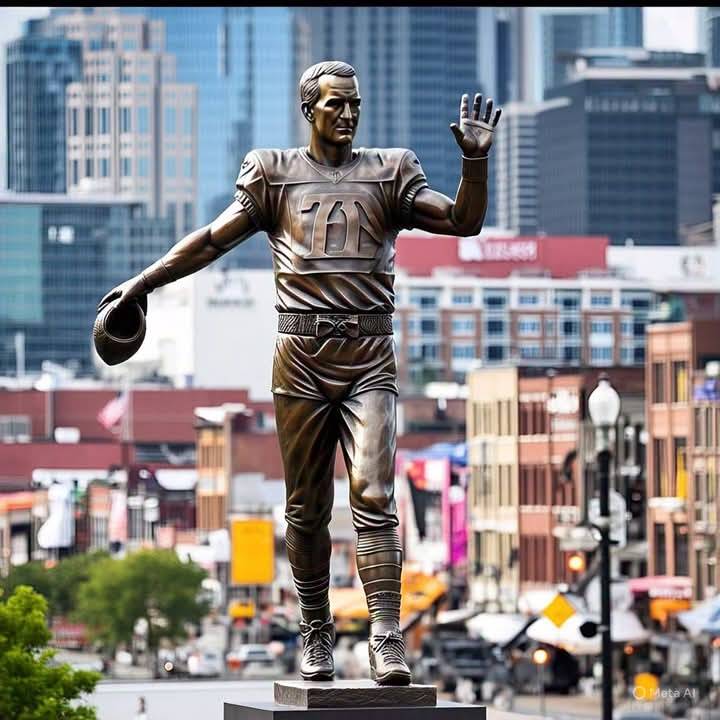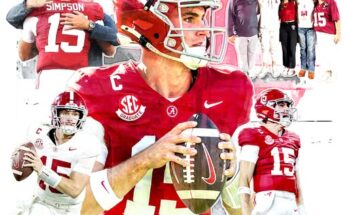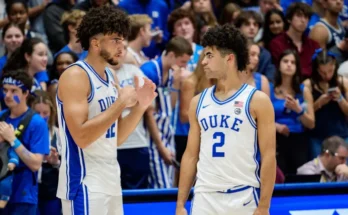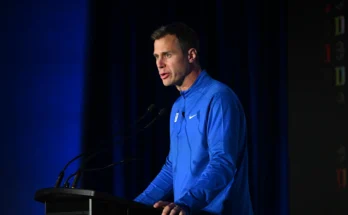Knoxville, Tennessee: A Lasting Tribute to a Tennessee Legend: Peyton Manning Statue Immortalized Peyton Manning stated that the piece was never about him and that he never wanted a statue.
In the heart of Knoxville, Tennessee, where football is more than just a game, the legend of Peyton Manning has long loomed large. A national icon, a two-time Super Bowl champion, and one of the most beloved quarterbacks in the history of the sport, Manning’s impact on the University of Tennessee Volunteers transcends statistics and trophies. Yet, for all that he accomplished, Manning never sought monuments, titles, or tributes. And that’s what makes the towering bronze statue outside Neyland Stadium even more special—a lasting tribute to a man who never wanted one.
“I never wanted a statue,” Manning humbly stated during the unveiling ceremony. “This has never been about me. It’s always been about the University of Tennessee, my teammates, and the people who supported me from day one.” His words echoed through the crowd, a testament to the selflessness and humility that made him such an icon—not just in Knoxville, but across the nation.
The statue unveiling took place on a warm Saturday afternoon, just hours before a Vols home game. Alumni, fans, former teammates, coaches, and university officials gathered to witness history. At the center of it all stood Peyton Manning—ever gracious, ever composed—accompanied by his family and former coach Phillip Fulmer.
Standing at over seven feet tall, the statue depicts Manning in his signature No. 16 jersey, poised in a classic quarterback stance, ready to deliver one of the many passes that defined his Tennessee career. Sculpted with meticulous attention to detail, the likeness is uncanny, capturing not just the form of Manning, but his poise, confidence, and football intelligence.
For Tennessee fans, the statue is more than a tribute—it is a symbol. It represents an era of resurgence, leadership, and hope. Manning’s tenure at Tennessee from 1994 to 1997 brought national attention to the program, culminating in an SEC Championship and a runner-up finish in the Heisman Trophy voting. Though he never won the Heisman, to Volunteers fans, he was the best player in the country—and perhaps the best to ever don the orange and white.
Peyton Manning’s modesty about the statue reflects the way he has always carried himself. Despite his fame and accolades, he has never lost his sense of perspective. “The University of Tennessee gave me an opportunity and a home,” he said. “This place shaped who I am.”
Manning has always deflected praise toward his coaches, teammates, and the university itself. That humility endeared him to fans even more. While other players might crave the spotlight, Manning consistently deflected attention. He was the face of the program without ever asking to be.
That’s why Tennessee’s decision to honor him with a statue wasn’t about satisfying his ego. It was about saying thank you—to a man who elevated the program, mentored younger athletes, and carried himself with class during every stage of his career.
Though Manning’s on-field accomplishments are staggering—over 11,000 passing yards, 89 touchdowns, and a 39-6 record as a starter at Tennessee—his legacy is even richer off the field. Throughout his life, Manning has been deeply involved in philanthropy and mentorship.
The PeyBack Foundation, which Manning founded in 1999, supports disadvantaged youth by funding programs in areas such as leadership, education, and after-school development. His commitment to giving back has touched lives not just in Tennessee, but across the country.
Within Knoxville, Manning has maintained a close relationship with the university, often returning for games, speaking engagements, and even classroom visits. He has mentored young quarterbacks, spoken to business students, and donated millions to support university programs and scholarships. His name adorns the Peyton Manning Scholarship, awarded annually to incoming freshmen who exhibit leadership and academic excellence.
When you talk to people in Knoxville about Manning, their admiration runs deeper than football. “He’s a class act,” one fan said. “He never forgot where he came from. That statue isn’t just for him—it’s for all of us who watched him grow up here.”
Manning’s years at Tennessee were transformative. He arrived during a time when the Volunteers were solid but not spectacular. Under the guidance of Coach Phillip Fulmer, Manning helped usher in an era of dominance in the SEC.
His decision to return for his senior season in 1997—eschewing the NFL draft despite being projected as the No. 1 overall pick—was a turning point. That choice exemplified his commitment to his teammates and the program. It also galvanized the fan base and made clear that Manning valued something greater than personal glory.
Though he didn’t win a national championship at Tennessee, Manning laid the foundation for the team’s eventual 1998 title run, led by quarterback Tee Martin. In many ways, Manning’s presence raised the bar for what Tennessee football could be—and still aspires to be.
At the statue unveiling, former head coach Phillip Fulmer gave an emotional speech reflecting on Manning’s time with the Vols. “Peyton wasn’t just a quarterback,” Fulmer said. “He was a leader, a coach on the field, and the kind of person you build a program around.”
Fulmer recalled Manning’s tireless work ethic—the early morning film sessions, the relentless practices, the constant drive to improve. “There were no shortcuts with Peyton,” Fulmer continued. “He was the first one in and the last one out. And he held everyone else to the same standard.”
The bond between coach and quarterback was evident. Their mutual respect is one of the great relationships in college football history—built not only on winning games but on a shared vision of excellence and accountability.
Statues often serve as timeless reminders of a person’s impact, and this one is no different. For generations to come, fans will walk by Manning’s bronze likeness on their way into Neyland Stadium. Young quarterbacks will look up and dream. Families will stop to take photos, recalling games and moments from the past.
But more than that, the statue serves as a reminder of the values Manning embodied: perseverance, humility, leadership, and loyalty. Those are lessons that extend far beyond the gridiron.
University of Tennessee Chancellor Donde Plowman summed it up during the dedication ceremony: “This statue is a celebration of excellence—not just athletic excellence, but human excellence. Peyton Manning is an ambassador for this university, and we are proud to call him one of our own.”
In his speech, Manning offered advice to today’s student-athletes. “Take pride in where you come from. Show up early, stay late, ask questions, and treat people with respect,” he said. “You may not all end up with a statue, but you can all leave a legacy.”
Those words carried weight, especially coming from someone who could have easily made the moment about himself but instead turned it into a lesson. For Manning, it was never about chasing statues. It was about chasing greatness in the right way.
He closed with a smile, looking out at the sea of orange: “I’ll always be a Volunteer. This is home.”
In the years since his playing days, Peyton Manning has become more than just a football legend—he’s become a part of the cultural fabric of Knoxville. The statue now serves as a permanent marker of that connection, a physical embodiment of a career and a character that continue to inspire.
In many ways, Tennessee didn’t build the statue for Peyton Manning—they built it for themselves. For the fans who watched him on crisp fall Saturdays, for the coaches who helped mold him, and for the future generations who will grow up in his shadow, dreaming their own dreams.



